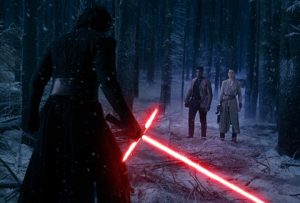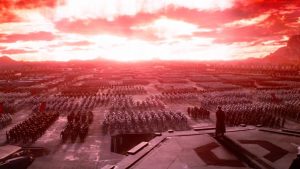We are officially in the last leg of the long journey to Star Wars: The Rise Of Skywalker, which means that the mighty Skywalker Saga, a story spanning forty years across films, books, comics, cartoons and video games is finally coming to a close – which in turn means that it’s time to reflect on that nine-part saga and take a good long look at the films that predate and inform Rise Of Skywalker‘s epic conclusion.
To do that, we’re going to have to discuss spoilers for each of the eight films in the Saga, so…SPOILERS AHEAD.
Star Wars: The Last Jedi

If you’re reading this review, you’re probably aware that this film has sparked a very hostile, very aggressive reaction from both its defenders and detractors. The division in the Star Wars fandom over whether or not The Last Jedi is good, bad, or even an actual part of the series’ canon, has overshadowed many of those who attempt to talk about the film without suddenly veering into angry rants. You see, the thing is: there is no right answer, because opinions are subjective. Subjectively, The Last Jedi is the best Star Wars movie: there, I said it. I’ll also say this – it’s a masterpiece of cinema, and, apart from a few iffy bits, a great film. And you don’t have to believe, listen to, or even acknowledge what I’m saying.
I do hope you’ll at least take some time to listen, though, because Jedi is a film I feel passionately about, and I hope my arguments for why are at least understandable.
The movie came at a crossroads in the saga’s history, and it’s not surprising that the story reflects that, touching on themes of evolution, and the process of adaptation: if you read between the lines, it’s not hard to see that Jedi is speaking directly to the fandom, and addressing the glaring generational divides within its ranks. “They are what we grow beyond”, Master Yoda (voiced by Frank Oz) says at one point, and it’s like he’s talking about the new generation of Star Wars aficionados. If only the transition of power could be so peaceful in real life!

Unfortunately, Star Wars has always had a problem with a particular group of fans known as “gatekeepers”. These are typically the fans who grew up with the films back in the 70’s or early 2000’s, and now claim to be experts on the franchise. They can probably recite the names of several obscure Outer Rim planets, or give you the entire history of the Old Republic with textbook accuracy, or tell you the life-stories of every single person and alien inside the Mos Eisley cantina in A New Hope. The problem comes about when they start lecturing new, less experienced fans about how they’re the “real” fans, the films were made for them and their enjoyment, and anything that disagrees isn’t canon. The character of Kylo Ren (Adam Driver), who lectures the film’s heroine with a long-winded tirade about how she’s “a nobody” who doesn’t belong in the illustrious saga of the Skywalker family – he’s like the ultimate worst example of a gatekeeper: the type who doesn’t want to see women or minorities in “his” story.
But it’s not just diversity that gatekeepers have been afraid of for years: but also a new group of fans and movie-goers in general, who want to see the story branch out in new directions or take bold, new risks, rather than repeating past hits and highlights for the next decade. And director Rian Johnson has made a film appealing to those people – The Last Jedi is strongly reliant on the idea that there is no one Star Wars story: everybody has their own opinion on the beloved series, and that’s good. There are no right answers. There is no right Star Wars. It’s a theme he reinforces in many different ways, sometimes loudly, sometimes more subtly: since I previously mentioned Kylo Ren as a gatekeeper, let’s turn the tables and look at the villain’s mirror image and moral opposite, the mysterious Rey (Daisy Ridley). She’s been asked time and time again who she is, where she comes from, what makes her so special – but what she learns to accept in this movie is that, yes, as Kylo said, she’s a nobody, probably nothing more than the daughter of some nameless pair of scrap-traders on the desolate heap of Jakku. She (and we, the audience) have been waiting patiently to see who Rey’s parents will turn out to be, but the big revelation is that they don’t matter: because in the original Star Wars, long before “I am your father” or much less midi-chlorians, had been conceived, anybody could be a hero, no matter who they were or what background they came from. At the very end of the movie, we see it once again in the shape of a young, Force-sensitive boy on Canto Bight, who looks up at the stars with eyes full of wonder: this movie is as much about him as it is about anyone, because it’s a story about passing the torch from generation to generation, and about the legends we inspire in our lifetimes that will influence a new group of heroes.
Many people claim that The Last Jedi‘s overarching theme is best exemplified by Kylo Ren’s singularly pessimistic line: “Let the past die. Kill it if you have to.” I could not disagree more. Jedi never once tells us to forget our past – in fact, on multiple occasions, it requires its cast of characters to confront their own pasts and learn from past failures. I mean, Yoda himself says it: “The greatest teacher, failure is”. That’s at least one of the themes of The Last Jedi – that you can’t run from your past, you need to embrace it and see if you can learn from it. If you can find a balance and live between your past and your future, then happy will you be.

And that word, “between”, is what will lead into the next section of this review, because I say so and I don’t have a better lead-in. The idea of duality has always been present in Star Wars, present in almost every aspect of the galaxy’s society, as we’ve discussed; but Jedi is the first film to tackle the theme head-on and explore the gray area in between any two things. It’s something most noticeable in the parallel journeys of Rey and Kylo Ren, who find themselves being pulled away from their respective sides of the Force and towards each other, in some neutral zone between the Light and the Dark, between Jedi and Sith, between Good and Evil. The struggle is great for both of them, as neither one truly understands what is happening, or why they are being called to each other. In their haste, they mistake it for a semi-romantic attraction (I don’t ship the “Reylo” pairing, and I think it works best when you look at it as merely an idea that Rey and Kylo got stuck in their heads during their many telepathic encounters: it’s notable that after they actually meet in person, neither one shows any romantic interest in the other). Rey and Kylo are very hesitant to inch away from their own separate corners of the Force, and even in their epic showdown neither one offers to turn, as they both had thought the other would: instead, they spout their own propaganda at each other. It’s Kylo who, surprisingly, comes closest to the truth when he begs Rey to join him in a world where there are no Jedi, no Sith, no First Order, no Resistance. But – surprise, surprise – his idea for how to achieve that perfect world involves intergalactic genocide. In the end, neither Kylo nor Rey is able to make the first move towards establishing a balanced universe, and Kylo ends up retreating back into the shadows, becoming Supreme Leader of the First Order and doubling down on his attempt to destroy the Resistance. But the meeting of these two champions still gives us reason to hope for a universal oneness someday – in their coup against Supreme Leader Snoke (voiced by Andy Serkis) Rey and Kylo stand back-to-back and fight side-by-side, without a side. They swap lightsabers for a minute, using opposing sides of the Force to fight. Even when they do move to fight each other, neither one is able to claim Luke Skywalker’s lightsaber for their own, to the point where the saber actually splits in half rather than choose an allegiance. These two are wholly separated, but also connected by a powerful bond. Whether we’ll see them stand together in Rise Of Skywalker or go their separate ways, is anyone’s guess.
But based on what Johnson started in his film, I wouldn’t count out the possibility of Rey and Kylo joining each other in the critical gray area between Good and Evil. In The Last Jedi, morality is a societal construct, and one that means little when held up to scrutiny: as codebreaker, jailbreaker and turncoat extraordinaire DJ (Benicio Del Toro) reveals, both the First Order and the Resistance are buying their weapons from the same suppliers, who in turn squander their money on the lavish – and possibly illegal – pleasures of Canto Bight. While we’re on the subject, I have to ask whether anyone actually likes the character of DJ, or wouldn’t have preferred if Finn (John Boyega) and Rose Tico‘s (Kelly Marie Tran) paths had led them to the person they were actually looking for in the first place, the Master Codebreaker all-too briefly portrayed by Justin Theroux?
Even heroes like the once-mighty Luke Skywalker (Mark Hamill) make questionable choices: arguably the biggest shocker in the movie is when it is revealed that Luke, in a moment of weakness, went to kill a young Kylo Ren as the boy slept. Many fans argue that this is a betrayal of Luke’s character, as we had previously seen him risk his life to try and bring Darth Vader back from the Dark Side. I get where they’re coming from, but it’s also not like Luke hadn’t exhausted much of his strength and stamina fighting Vader. He probably wasn’t too keen on the idea of spending the remaining half of his life struggling to redeem his nephew’s soul. And let’s not forget that, while under Palpatine’s corrupting influence, Luke did try to brutally murder Vader and started lopping off his limbs. Luke has always been a wild card: it’s in character for him to be conflicted.

It’s the same situation within the ranks of the Resistance, where people are more concerned with doing the right thing than looking like heroes: the violet-haired Admiral Amilyn Holdo (Laura Dern) even has to squash a mutiny led by “trigger-happy flyboy” Poe Dameron (Oscar Isaac), after he decides to disobey her orders and make up a new plan on the fly, as he so often does. The film at first makes us think that Holdo is a villainous or morally questionable character because she doesn’t tell her plans to Poe, but ultimately turns the tables on us and reveals that it was Holdo, all along, who had the right idea, and that she didn’t reveal her plans because Poe had been demonstrated earlier in the film to be unruly and unmanageable, and she knew he would never follow through with her last-ditch, self-sacrificial plan. But with the help of a little Leia ex machina, everything gets sorted out and Holdo proceeds to enjoy one of the coolest death scenes in film history, as she flies a spaceship at light-speed straight through the attacking First Order fleet, cutting star destroyers in half with blinding accuracy. For more on why Admiral Holdo is actually the best character in The Last Jedi, you can check out this article here.
Sadly, there’s another prominent theme in this movie: that of saying farewell, and going out on a high-note. Carrie Fisher, who had portrayed the indomitable Princess Leia Organa since 1977, passed away at the age of 60 just a year before The Last Jedi opened in theaters. When the film came out, it was clear that Carrie went out on a high-note, finally getting to use the Force in one of Jedi‘s most memorable moments. While there is suspicion that she will have a small appearance in The Rise Of Skywalker, it’s comforting to know that at least she got to be a true Skywalker before her passing.

In-universe, however, it’s Luke Skywalker who gets an epic send-off, using the last of his strength to distract Kylo Ren long enough to let the Resistance escape through his fingers. His death, alone and at peace, watching the sunset just as he did forty years previously when his journey began on Tatooine, is poetic and beautiful. Though he had been troubled in life by his own failure to stop the spread of evil, he was able to leave the world knowing that he had done his best. Think of it this way: at least he got a death scene. Poor old Admiral Ackbar was simply pulled out into the frozen vacuum of space without any warning. Luke also had the good fortune to die in some of the best lighting Star Wars has ever produced – seriously, what happened to the days of moodily lit, smoky underground space-pubs and dark Death Star corridors? Nowadays, a respectable Skywalker wouldn’t be caught dead walking around without at least two different setting suns shining down on him and perfectly illuminating him from every possible angle. And I haven’t even mentioned the cloak: I mean, let’s be honest here, Aragorn and Harry Potter wish they had cloaks like Luke Skywalker’s – the final scene of it blowing away across the oceans of Ahch-To is so sad in part because that beautiful accessory is going to land somewhere in the water where it’s impossible to salvage. Most of the scenes of Luke’s beautiful island hermitage were filmed on the remote island of Skellig Michael, off the coast of Ireland. Everyone likes to rant and complain about Luke turning into a weird old man drinking green milk and hunting giant codfish, but why don’t we ever talk about the fact that he lived, undisturbed, for however many years, in one of the most gorgeous places in the Star Wars universe? I mean, seriously, if you’re going to get angry, at least get angry about the fact that he never had the courtesy to invite anybody to his island getaway!
Speaking of which, let’s just run through some of the locations visited in The Last Jedi. Aside from Ahch-To, which, admittedly, is pretty lonely aside from the random group of Jedi nuns and a couple hundred adorable porgs, we also visit the glittering vistas of Canto Bight, the Star Wars version of Monte Carlo, and the planet Crait, a snowy planet covered in blood-red soil which allows for some of the most family-friendly goriness we’ve ever seen in Star Wars, even under the Lucasfilm banner. Maybe you don’t like the movie, maybe you hate the themes, the characters, the whatever…but can we all agree that these locations are amazing?
The Last Jedi also includes some epic action sequences: most notably an opening battle that rivals the similar opening of Revenge Of The Sith, except that this one has the instantly lovable, resilient Paige Tico (Ngo Thanh Van) giving up her own life to save the Resistance, and not a bratty teenage nightmare named Anakin Skywalker. Thus, this battle actually tops the opening battle of Sith in my opinion, and gets the film rolling along at breakneck speed. To add onto that, why don’t we give enough credit to the complexity of Rose Tico’s character, at least at first? There she was, having just lost her sister, and she finds Finn trying to flee in one of the escape-pods to go look for Rey (as if she needs his help). While Rose really doesn’t have anything to do beyond that initial scene, it’s infinitely amusing to watch her zap Finn into unconsciousness to prevent him from “deserting” – and, even though we never actually see any real deserters, the scene indicates that multiple people have tried to run from the fight, making the Resistance feel like an actual army rather than just a bunch of the most perfect, fearless people in the galaxy teaming up to fight evil.

There are multiple disappointing moments in the film beyond the usual ones that get brought up all the time, like about how “the escapade on Canto Bight serves virtually no purpose”, or “Snoke’s backstory was never explained”, two things that are certainly problematic. But in the name of originality, and mostly because I’m just a big Gwendoline Christie fan, here’s a complaint that doesn’t get brought up as much: the huge waste of a character that is Christie’s Captain Phasma. While it’s already frustrating that Christie was forced to hide under a heavy suit of metal throughout her time in the franchise, it’s even more annoying that, while male metal-clad characters like Darth Vader and The Mandalorian all get cool action scenes despite being helmeted and hidden, Phasma was never able to do anything truly impressive with her limited screentime. If they weren’t going to use her in any way in The Last Jedi, why didn’t they just leave her in some random trash-compactor on Starkiller Base back in the last movie? How did she even get off of Starkiller Base before it exploded? I have a lot of questions.
If you allow me to continue talking, I will begin to ramble, and rambling leads to meandering, which leads to whatever it is I’m doing right now. And that is why I must now say goodbye to you, dear reader. We’ve worked our way through more than four decades of Star Wars history to get to this point, and we’re finally here, at the end of all things. Very soon, I will have the pleasure of being able to see The Rise Of Skywalker, and I can only hope it lives up to not only my expectations, but those of fans around the world – some of whom have been waiting for this movie since 1977. Think about that, for a moment, and then consider the message of The Last Jedi, a movie that, at its core, is simply trying to make sure that the fire of rebellion never goes out.
Never stop watching Star Wars. Never stop sharing it with new people. Never stop fighting for hope and freedom, in any way you can. The Last Jedi reminds us that we are all part of the Skywalker Saga – no matter who we are, where we come from, or what we look like. Star Wars belongs to all of us, and that will never change.
May the Force be with you.
Movie Rating: 9.9/10




